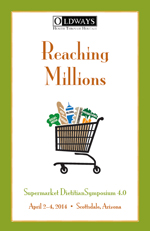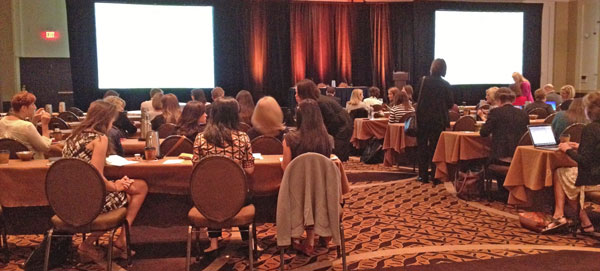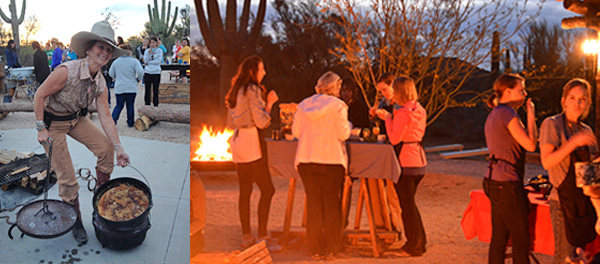Oldways recently welcomed 90 supermarket dietitians, health and wellness professionals, and representatives from food companies and commodity boards to our Fourth Annual Supermarket Dietitian Symposium in Scottsdale, Arizona, April 2-4.
The theme for this year’s symposium was Reaching Millions. And that is exactly what these supermarket dietitians are doing their work has the power to not only impact sales within their stores but the health of millions of consumers across the country.
We always look forward to this event, which focuses on how everyone in the room can explore ways to join forces and work together on the mission to change customers purchasing behavior and improve their wellbeing. Today, in addition to worrying about their food budgets, American consumers are confused by a barrage of dietary options. They hear about paleo and low sugar diets, among many others, worry that they should avoid gluten, and want to know how and where their food is grown or raised. Dietitians who work in supermarkets are uniquely positioned to help consumers navigate these and many more issues through in-store programs, messaging, recipes, demos, tours, classes, consultations, and social media.
The event began with our Wednesday night speed networking reception, an opportunity for old friends to reconnect and symposium newcomers to meet everyone in the group. On Thursday morning, Oldways consultant Barbara Ruhs, MS, RD, LDN kicked of the session of formal presentations with the reminder that supermarket dietitians have the power to make a serious impact on public health. She emphasized the importance of sharing ideas and asking questions to help and some actionable answers.
Here’s a sampling of the symposium speakers. Click here to see these and other presentations.
Dr. Collin Payne and Dr. Mihai Niculescu, professors of marketing at New Mexico State University, focused on shopper marketing, which is all about understanding the psychology of shoppers and the behavior of shopping. They explained that 50% of consumer purchases are planned; shopper marketing focuses on the remaining 50% unplanned wants and forgotten needs. They shared some intriguing tricks they’ve implemented in supermarkets to change shopper behavior and increase produce consumption. In one experiment, using wide strips of tape, they divided shopping carts in half and handed out yers telling shoppers to put fruits and vegetables in the front half, everything else in the other half. Use of The Half Cart resulted in a 102% increase in fruit and vegetables purchased without increasing overall cart totals. They have also studied the positive impact of using green arrow oor stickers pointing to the produce section on the store poor, and putting a mirror in the shopping cart to increase self-awareness of a customer’s own physical appearance at the point of purchase.
Darren Tristano, Executive Vice President of Technomic, reported on trends for Millennials (ages 21-36); Generation X (ages 37 47); and Baby Boomers (ages 48 66). Despite differences in how and where they get their information and recommendations, three-fifths of consumers and more than two-thirds of those ages 25 34 say they eat more healthfully when they prepare meals at home. They believe that control over ingredients and cooking products are the primary reasons why home meals are healthier than restaurant meals. Darren also showed that supermarket locations supporting the local community show strong correlation to customer loyalty. And he emphasized that providing education on nutrition, food intolerance, and product sourcing will be a key to the future.
Sharon Palmer, RD, spoke about the myths surrounding soy, one of the most misunderstood foods of our age. She pointed to the fact that soy has been consumed regularly in Asian populations for centuries. In Japan, a country with low breast and prostate cancer rates and high longevity, soy is included in the diet daily. A body of scientific research shows soy is linked with reduced cholesterol, lower risk of heart disease, possible reduction of hot flashes, and reduced risk of breast and prostate cancer.
We built in lots of time for networking and sharing ideas around the table. Small group discussions included How to Grow Your In-Store Dietitian Program, Establishing an Employee-Wellness Program, Social Media, and Measuring ROI, among others. And then, to give everyone a taste of the true southwest, we traveled to McDowell Park to hike, bike, ride horses, and learn archery. Providing a selection of delicious fresh ingredients, Cow Girls Forever divided everyone into salsa-making teams and then treated us to an authentic Dutch oven campare cookout.
Now, back in Boston, we’re already planning the 2015 symposium. Stay tuned!
-Georgia










Leave a comment